By Bob Regan
OER Project Director
Ten years. It’s been 10 years since the first eight teachers rolled out the very first pilot of the Big History Project (BHP). Six of those teachers were in the US, two in Australia. Things have scaled a bit since then. In 10 years, we’ve served over twenty thousand teachers and one million students. This is quite a milestone. We’re incredibly proud of the work we’ve done, and we’ve learned a lot along the way. Perhaps the most important insight we’ve gained in these 10 years is that a great curriculum is not enough. The key to our program’s success is in the teachers. It’s in the feedback they provide. It’s in the ideas they generate and share among one another in our community. It’s in the single-minded focus they demonstrate each and every day to help their students not only succeed but thrive in an incredibly complex world.
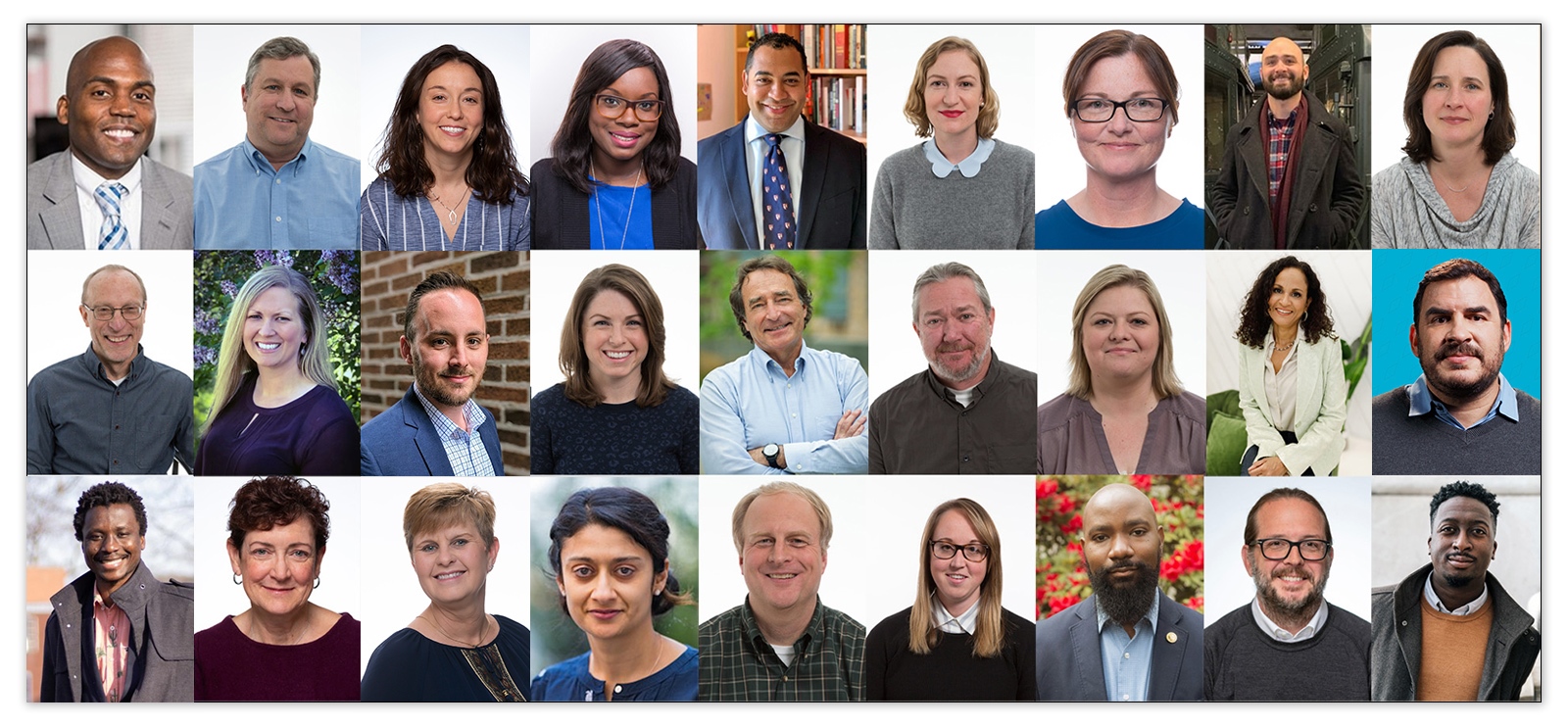
We launched the Big History Project to support just one course. Bill Gates had taken a DVD series from The Great Courses, Big History, and he was fascinated by the approach of its author, David Christian. In his course, Christian focused on big questions, questions that connected the past to the present with an eye to the future. He addressed historical questions by drawing upon the insights of multiple disciplines, and provided an organizing framework in the form of “thresholds.” These thresholds created an overarching narrative that linked the Big Bang to the origins of life to the Industrial Revolution and on into the future. It was these thresholds that helped structure ideas and inquiries. “A framework for all knowledge” was how Bill was fond of describing Big History in those days. As time moved on, we came to realize exactly how true that was. The big questions that hook and engage students are not limited to one course or the pages of one textbook. And so, Big History Project was born and rapidly took off.
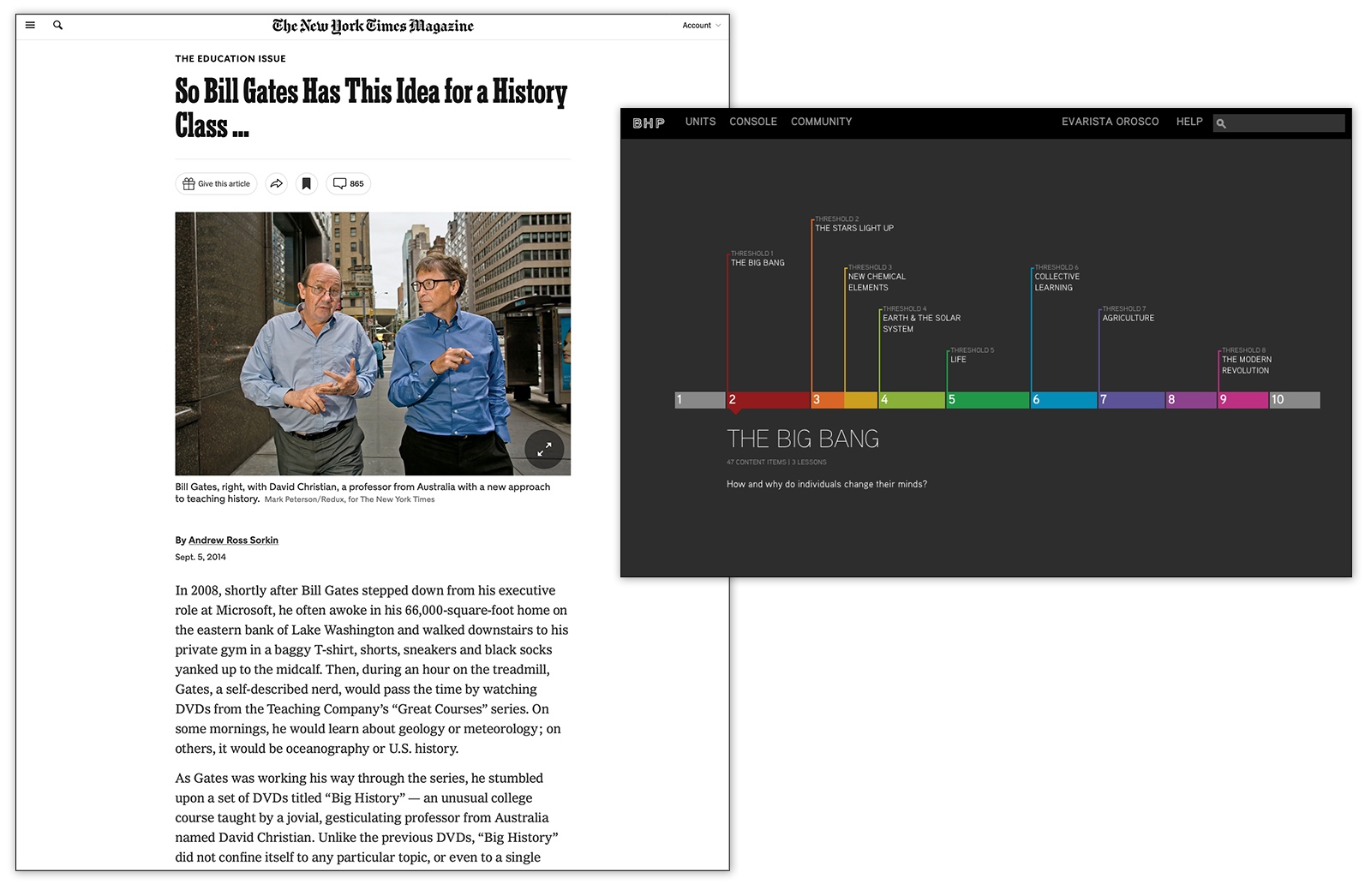
After about four years of its growth, we decided to examine BHP’s impact on students. We reached out to schools where the Big History Project was taught, and we evaluated the progress of students two years after they had completed the course. What we found surprised us: two years later, kids were still using BHP concepts such as claim testing and thresholds. At first, we were excited—the ideas were really sticking! The excitement, however, wore off, as we came to this realization: These kids were two years older—they shouldn’t be using the same tools they had used two years earlier. We wanted to see them use more sophisticated tools—tools they would need in college, such as contextualization and causation. While there were many individual resources available for looking at these ideas, no one was carrying on the work we were doing with a comprehensive and coherent curriculum. We realized that if we wanted to make such a curriculum available to students, we would need to build it ourselves. At the same time, we’d been fielding requests for additional courses that used the rigorous approach we’d developed for BHP, requests that included frequent calls for a world history course.
With this feedback and insight in mind, we collaborated with a group of scholars and teachers to design and built the World History Project (WHP). From there, the OER Project was born: a family of free, online, comprehensive curricula for social studies teachers and their students. OER, or open education resources, put simply, is free curricula for schools. It is our hope that in time there will be a quality OER curriculum for every subject, for every grade. But even if we’re able to realize that vision, even if every single offering is incredible, rigorous, and engaging, it still won’t be enough: we need you.
Teachers are the keystone of OER curricula. Since launching WHP in its three periodizations, we’ve also launched a World History Project AP® curriculum, which aligns with the AP® World History: Modern exam, as well as the Climate Project three-week course. These newest additions to the OER Project family of courses wouldn’t have been possible without the support of our community of teachers and scholars—and we’re here to support you.
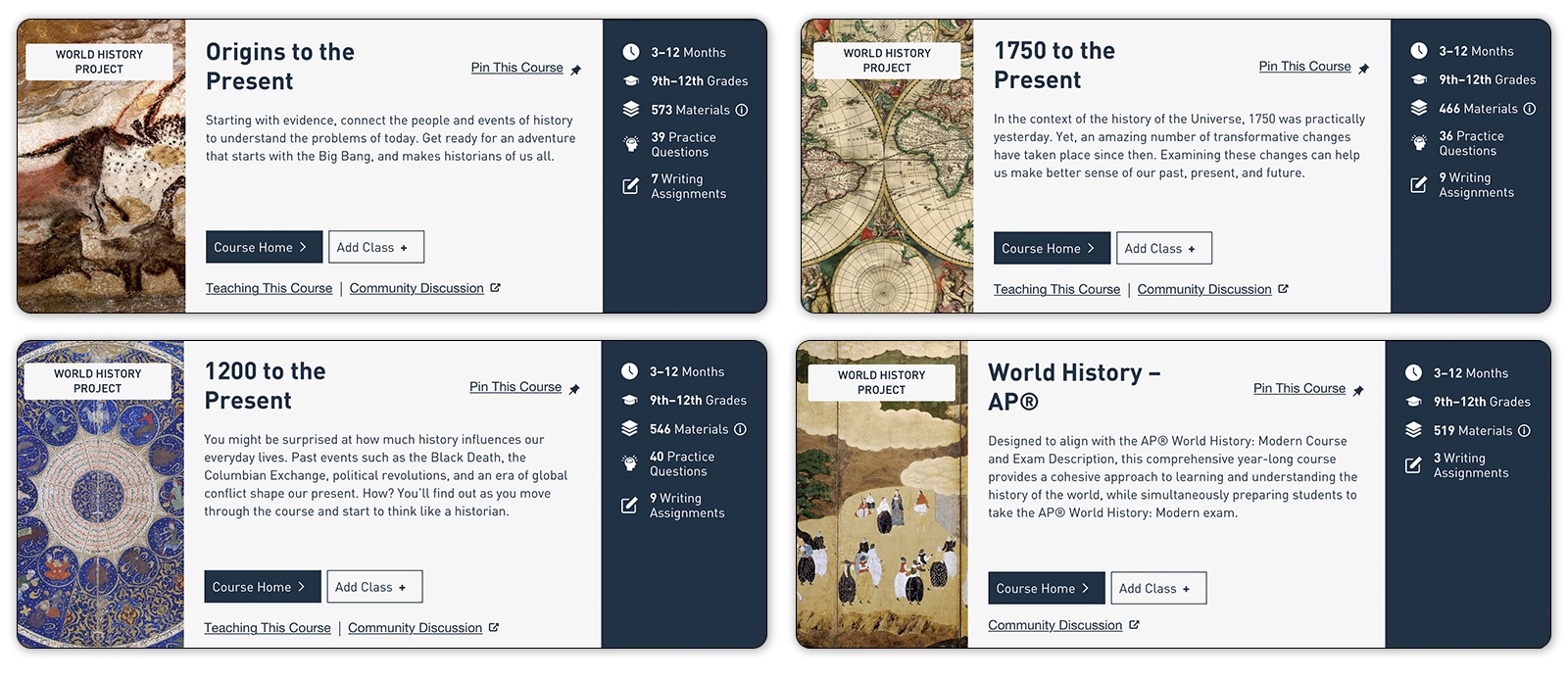
A great curriculum without support for teachers is just another tree falling in the woods. It makes no sound and rarely has a meaningful impact. How a curriculum is used and supported makes an enormous difference, particularly to new teachers who have yet to develop a bag of tricks for supporting students in the midst of engaging with big ideas and essential skills. Perhaps the most important insight we’ve had over the years is that a curriculum combined with professional development is far more valuable than either on its own. Seems obvious, right? Yet, we see this combination far too infrequently. Our approach to creating this curriculum/PD package, one particularly helpful to teachers who are just getting started, has been honed over the years. We invite outside experts and scholars to come and talk about their research pedagogy. Perhaps most important of all is our teacher community where teachers get answers, share insights, and swap ideas for new materials. This approach to professional development makes the course far more effective. The fact that all the teachers are working around a common framework within the course makes the professional development more specific and far more useful. Over the last 10 years, I’ve come to understand that it’s these intersections that make us, us. Let me explain.
I love to cook, and cooking has provided me with a metaphor for thinking about the challenges of delivering curriculum. Traditional textbooks are like the Swanson TV dinners that I grew up with. They’re easy to make and occasionally really tasty, but they’re not very nutritional. And they do nothing to teach you the craft of cooking. Today, these frozen TV dinners have fallen out of favor—just as textbooks have. Today, we see loads of sites offering free individual lesson plans. These are like a delivery of produce from a community agriculture box. With an assortment of great stuff and a few imperfect veggies mixed in, these boxes offer the promise of great nutrition. Yet they offer us no instruction on how to prepare these ingredients, or which ones go together to create which meals. We need something more—something that offers nutritional ingredients and guidance for new cooks and experienced cooks as they try new things. That’s where the OER Project comes in. We strive to be the modern-day meal delivery kit—like Blue Apron or HelloFresh. We aim to provide great ingredients and guidance on how to make meals.
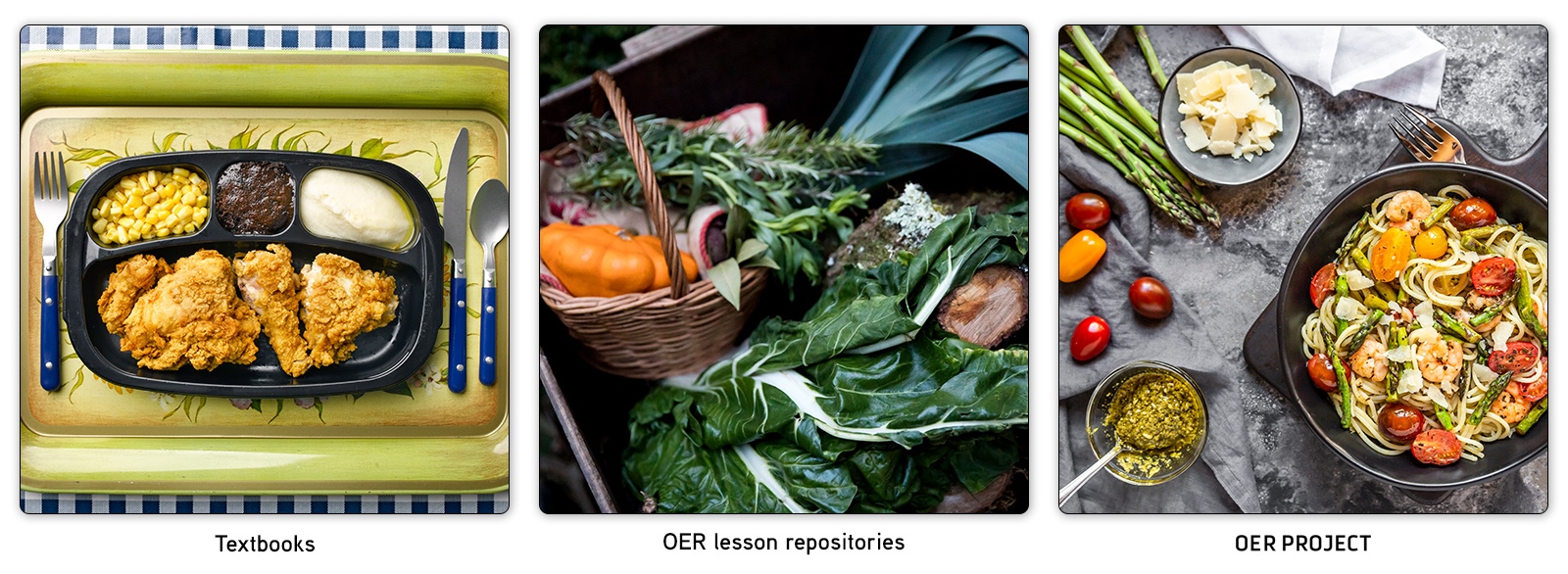
In the world of cooking, meal kits have been incredibly helpful to inexperienced cooks as they try new things. Over time, these new cooks rely less on the detailed instructions on the recipe cards, and they start to make new dishes independently. At OER Project, we’ve tried to follow a similar path. We want to provide instructions detailed enough for a novice teacher with ideas from the very best classrooms around the world, but retain flexibility for more experienced teachers.
But we’re not the only cooks in the kitchen! At OER Project, we rely on teacher feedback to make our recipes better. We facilitate conversations in our community about refinements to our materials and new approaches to creating lessons. We want to make our materials flexible enough that experienced teachers don’t feel constrained and are willing to share their insights, which might not otherwise have seen the light of day. One of our team’s most important leaders, Bob Bain, from the University of Michigan, calls this “the educative curriculum”—a curriculum that teaches students and facilitates learning among teachers.
As we reach this 10-year milestone of the OER Project, it’s important that we thank all the teachers that have ever used our materials. It is their feedback that’s helped to make our curricula as good as they can be. It is their fantastic suggestions for activities and other content that has taken us in directions we would have never explored on our own. It is their supportive collaboration in the community that has helped so many teachers—novice and veteran—grapple with the vexing and persistent challenges of the classroom. Thank you.
As OER Project looks ahead to its second decade, we invite teachers to join us in this great and ongoing experiment! Register today to access a community and family of free courses that is truly like no other.
 For full access to all OER Project resources AND our amazing teacher community,
For full access to all OER Project resources AND our amazing teacher community, 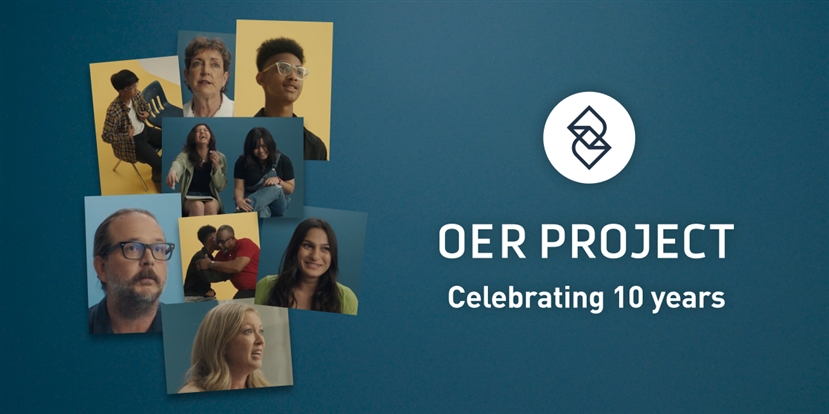
Top Comments